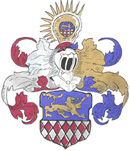
The Johannes Branch of the Fite Family
In 1907 Elizabeth Mitchell Stephenson Fite of New York City published a book entitled "The Biographical and Genealogical Records of the Fite Families in the United States". This book includes the family lines of the three brothers, Johannes, Heinrich, and Hans Jacob Vogt, who landed in Philadelphia, Pa., Sept. 28, 1749, from the province of Hessen-Kassel Germany. Johannes' line founded the Tennessee branch; Heinrich, the Maryland branch; and Hans Jacob, the Lancaster Co. Pa.,. branch of Fite families. This narrative of the Tennessee branch down to Thomas Bethel Fite is taken from Mrs. Fite's book. Elizabeth Mitchell Stephenson Fite was the wife of ( Jacob, Jacob, Leonard, Johannes ), only son of and great-grandson of . Dr. Fite was a very prominent physician and civic worker in Tennessee and later businessman in New York. His wife, Elizabeth, was a distinguished author and artist in New York, and her 153-page book giving the biographical and genealogical records of the Fite families in the United States is a real monument to her devotion, thoroughness, patience, and writing ability. The authors of this little booklet give grateful recognition to her for the information taken from her book, hereinafter referred to as "The Fite Records". Unfortunately, only two copies of "The Fite Records" are in the possession of the William Monroe and LaFayette Dorris Fite families. These two families were quite large and they and their children, (migrating from New Mexico), are now scattered over many of the Western states. Thus the lack of information about their ancestors by many of the descendants of these two families together with the desire to bring the records up to date furnished the inspiration for this booklet. These records would be incomplete without some of the information contained in the "Foreword" of "The Fite Records", which reads as follows: "The beginning of these records was made many years ago, when a great grandmother, at the ripe age of one hundred and more years, used to tell to the little great-grandson at her knee the story of the Revolution as she knew it. She told him of the sweetheart who marched away to fight; who promised to come back and marry her when the war was at an end; then would come the oft-repeated question - "And did he, Granny?" - and the oft-repeated answer - "Yes, He did, and I was the girl, and your great-grandfather was the soldier. " This episode of her girlhood occurred in New Jersey, far from the Tennessee home where the little lad had lived and where "Granny" rounded out her well spent days.
"Granny" also told the little lad of his great-great grandparents, Johannes and
Catharine, how they had eloped and come to America from Germany because they
knew they would never gain the consent of Catharines parents to her marriage.
Catharine was supposed to have been of noble birth. Told of the voyage over, of
the ship with their goods not reaching port, how they spent all they had to
sustain them on the long voyage, so that when they reached these shores they
went to live with a millwright in Philadelphia and Johannes learned the trade.
All of this and much more besides she told the child, and when a few year later,
after her death, he went to visit his grandparents, his grandmother continued
the story of his ancestors, beginning where "Granny Fite" had left off. She bade
him take pencil and paper and take note of what she said. This he did, and this
paper, written in his boyish hand, is still preserved and its contents formed
the basis for this book." The lad referred to above was Elizabeth Stephenson
Fite's husband, ,
great-grandson of the Revolutionary soldier, Leonard Fite, husband of "Granny",
(Margareth Cross Fite).
The present spelling of the name, Fite , has come down to this generation through many changes. The original name was Vogt, derived from the Latin Vocatus, meaning one who is called or appointed. The authorities give the derivation of Vogt as from the profession, such as that of a governor, warden or bailiff. In this country the numerous and varied spellings of the name were due to the clerks, registrars and tax collectors who knew little or no German and in their efforts to write it as it sounded, it has come down to us recorded Fogt, Foigt, Feit, Feight, Fight, Ficht, and Fite; the last spelling being the one most universally adopted after the Revolution.
The present spelling of the name, Fite , has come down to this generation through many changes. The original name was Vogt, derived from the Latin Vocatus, meaning one who is called or appointed. The authorities give the derivation of Vogt as from the profession, such as that of a governor, warden or bailiff. In this country the numerous and varied spellings of the name were due to the clerks, registrars and tax collectors who knew little or no German and in their efforts to write it as it sounded, it has come down to us recorded Fogt, Foigt, Feit, Feight, Fight, Ficht, and Fite; the last spelling being the one most universally adopted after the Revolution.